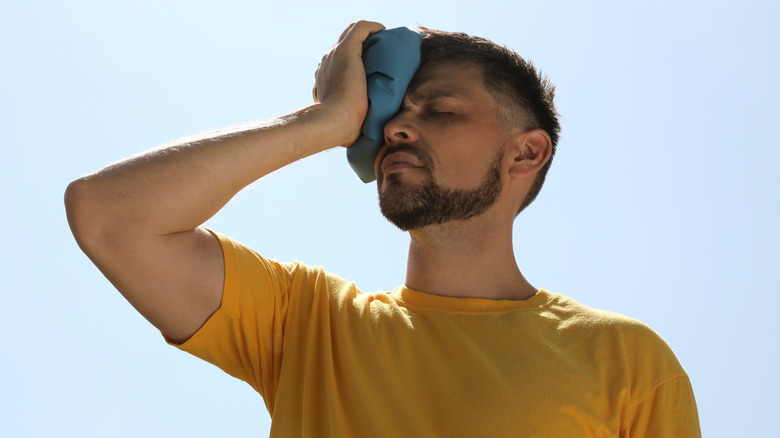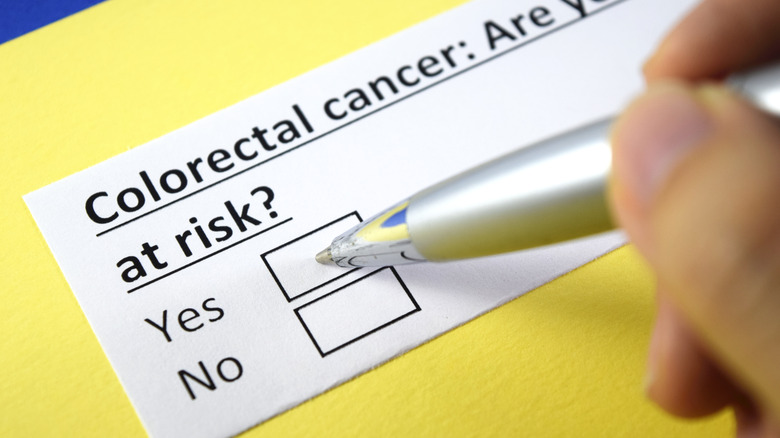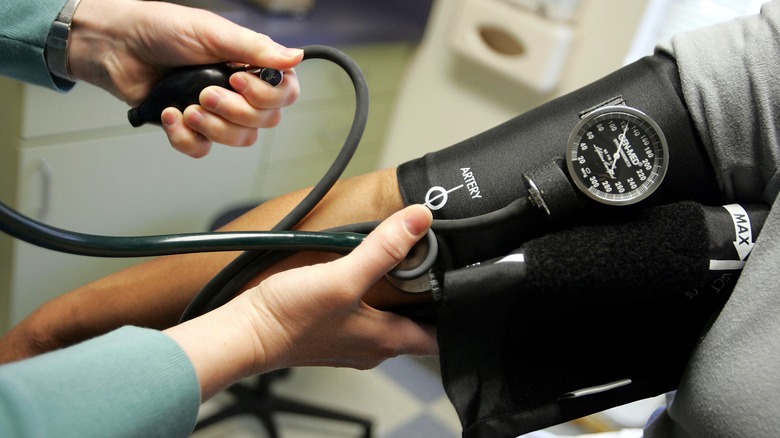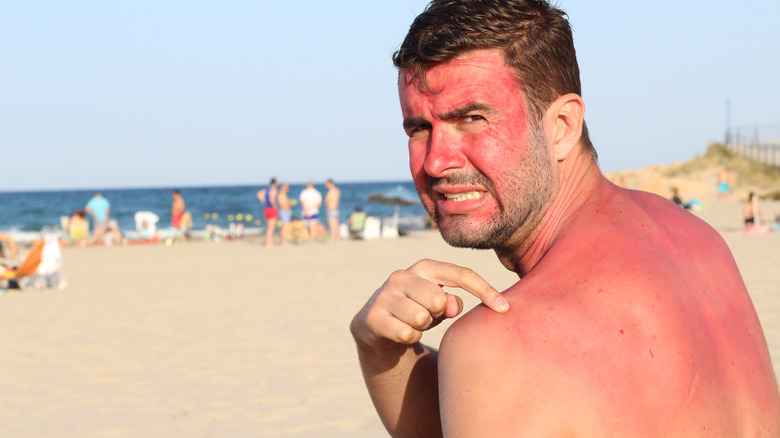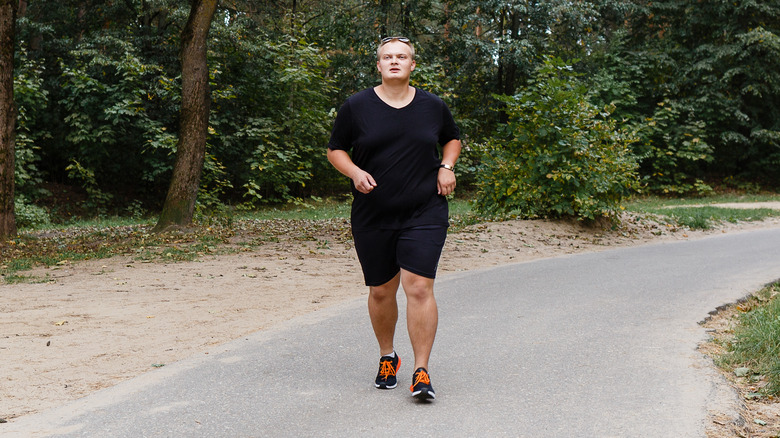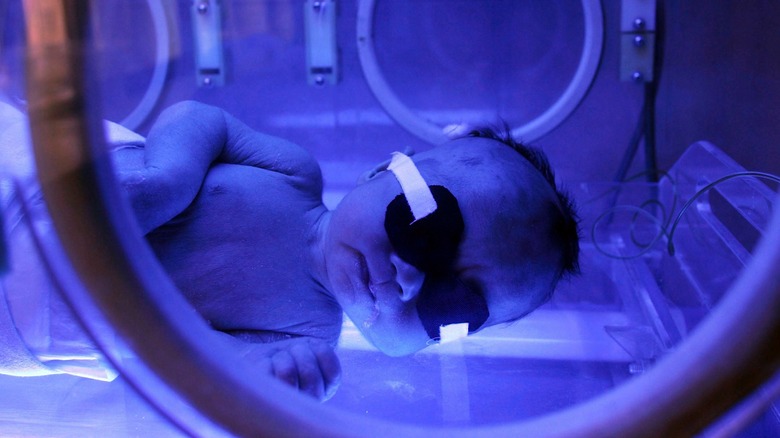The Real Effects Sunlight Has On Your Body
Isn't it strange how stepping outside and getting even a few minutes of fresh air and sunlight can instantly make a bad day turn into a good one? When that happens, there's more going on than just getting a feel-good sensation when the sun hits your skin. Science tells us that the sun's rays do some amazing things to our bodies, like synthesizing vitamin D (per Science Daily). This vitamin does all kinds of things for us, including boosting the immune system and keeping our bones healthy and strong (via Healthline).
We'll get into the numerous other ways that the sun affects our bodies in a moment. But before we dig into some of the benefits of sunlight, let's also remember that protecting ourselves when we're in the sun is the best way to enjoy its benefits. The American Cancer Society recommends using a sunscreen with SPF 30 protection or higher and reapplying it at least every two hours when you're outside or even more frequently if you're sweating or swimming. Also, keep your head and eyes protected with a hat and sunglasses.
Now, let's learn about how the sun affects our bodies each day.
You could sleep better
Are you having trouble falling asleep or staying asleep at night? You might just need a little more sunlight in your life.
Circadian rhythm is the natural cycle our bodies follow to stay awake and go to sleep. Usually, our bodies naturally start to feel sleepy during certain times of the day (like late in the afternoon) and more awake in the early mornings. According to the CDC, sunlight affects circadian rhythm. Our natural clock can easily become disrupted when there is too much bright light exposure, especially when it's two hours before bedtime. That could be why some people experience problems sleeping when clocks change for daylight saving time.
Similarly, the sun can help your body stay on track with its natural rhythms. The Sleep Foundation states that getting enough exposure to natural sunlight rather than artificial lighting can help your body align with sunrises and sunsets. This could put you in a more consistent sleep-wake pattern and help you doze off and stay asleep easier.
Thank the sun for your better mood
Let the sun shine through your windows or hit your face when you step outside, and you just might notice a quick shift in your mood. Healthline explains that when you're exposed to sunlight, your brain produces more serotonin. Serotonin is a feel-good hormone that's responsible for lifting your mood. It could be why you feel a little perkier on a sunny weekend morning than when your alarm goes off for work at 5:00 a.m. and it's still dark out.
If you notice that you feel more down during darker winter months, you're not alone. Seasonal affective disorder (SAD) is a real diagnosis characterized by depressive symptoms and moodiness through the fall and winter when sunlight is less available (via the Mayo Clinic). A primary treatment option for SAD? Phototherapy, which replicates natural light to improve symptoms.
Research published in a 2016 edition of PLoS One studied the relationship between sunlight and natural elements (like nature photos and potted plants) and employee mental health. While sunlight and natural elements both lifted workers' moods, sunlight had the more significant positive effect on their attitudes. Sunlight exposure also positively impacted reported job satisfaction.
You get a healthy dose of vitamin D
Vitamin D is necessary for bone health, could prevent chronic diseases and illnesses, and may lower the risk for problems with your heart and brain (via OrthoInfo).
Sunlight is a primary source for our bodies to get vitamin D, helping produce it through exposed skin. However, not getting enough time outdoors or enough sunny days through the year in certain parts of the country can affect how much vitamin D we can get from the sun alone. About one in four people in the United States do not get enough vitamin D (per the National Institutes of Health).
A 2017 study published in Science of the Total Environment found that during the sunnier spring and summer months, people can generally get the recommended dose of vitamin D by spending 10 to 20 minutes outside in the sun. However, in the winter or fall, you might need closer to two hours outside to get enough.
According to the National Institutes of Health, you can also get vitamin D from foods like milk, fatty fish, and egg yolks. Your doctor might also prescribe supplements if a blood test shows low levels.
Your body could experience heat exhaustion
Soaking in the sun outside can feel amazing for our body and mind. But staying in the sun too long — especially if you're already on the route to dehydration — could lead to heat exhaustion. Johns Hopkins Medicine lists some common symptoms of dehydration as thirst, dizziness, dry mouth, and increased heart rate or breathing. When you're out in the hot sun for a while, you'll typically sweat more, which could lead to dehydration faster than if you were inside, in an air-conditioned environment.
The CDC says that heat exhaustion can cause dizziness, nausea, weakness, excessive sweating, and an elevated body temperature, to name a few symptoms. In extreme cases, some people may experience heat stroke, which is a severe form of heat-related illness that may result in loss of consciousness or seizures. Heat stroke must be taken care of as quickly as possible to prevent disability or death.
Protect yourself from heat-related illnesses like heat exhaustion and heat stroke by being mindful of how long you're exposed to heat. Johns Hopkins Medicine also recommends wearing protective clothing (like sunglasses and a hat) when in the sun and drinking plenty of water.
The sun's rays might protect against some cancers
We talked about the sun being one of the primary sources for your body to get its daily dose of vitamin D, which does a lot of amazing things for our health. But did you know that some research has led some medical experts to believe that vitamin D could potentially be a breakthrough for cancer?
According to WebMD, some research has pointed to the possibility of vitamin D playing a role in preventing certain cancers, like colorectal cancer and breast cancer. However it seems that ongoing research is still necessary to better understand the relationship between vitamin D and cancer prevention, if any. Endocrinologist Michael F. Holick tells Cancer Network, "From my perspective, based on all of the information that I have reviewed, I think overall, the data is suggestive that [vitamin D] does help reduce the risk of deadly cancers."
One study published in a 2020 edition of Oncology shows some promise. Researchers conducted a clinical trial on over 25,000 participants using Vitamin D3 supplementation. Participants in the normal BMI range had the best response to vitamin D3 supplementation with regard to preventing the development of advanced cancer compared to those in the overweight or obese BMI ranges.
Step into the sun to decrease your diabetes risk
Medical professionals have known for a long time that there are a few things people can do to reduce their risk of developing type 2 diabetes. Among the most suggested are eating healthier, losing weight, and being more active. Often, someone diagnosed with prediabetes can make these changes to lower or reverse their chances of developing diabetes (via the National Institute of Diabetes and Digestive and Kidney Diseases).
However, sunlight could also be a key factor in preventing type 2 diabetes. A 2019 study published in The Journal of Clinical Endocrinology and Metabolism found that time spent in sunlight can lower fasting insulin and increase insulin sensitivity. Specifically, the results found that fasting insulin decreased by 1.27% per extra hour spent in bright sunlight. As a bonus, it seemed that sunlight also decreased triglyceride levels. One of the study's researchers, diabetes and endocrinologist consultant Constantinos Christodoulides, explained the findings (via Healio). "Increased bright sunlight exposure may be associated with a reduced risk for type 2 diabetes and heart disease by lowering blood insulin and lipid levels."
You could fight off illness easier
Spending more time outdoors on sunny days might directly impact your health in a positive way. Some research has linked the sun's rays to a bolstered immune system. For example, 2016 research published in Scientific Reports found that sunlight could encourage T-cells to go to work. T-cells are essential for immunity because they move through the body where they're needed to create an immune response. The study's senior investigator Gerard Ahern tells Georgetown University Medical Center, "This study shows that sunlight directly activates key immune cells by increasing their movement."
Vitamin D also has its own immune-boosting effects, so getting enough sunlight that increases the amount of vitamin D in your body could also produce a stronger immune system. Professor of medicine at Boston University Michael Holick tells The New York Times that he recommends vitamin D supplementation to many of his patients, with higher doses possible for overweight people, to keep their immune system in shape.
Sunlight might also target bacteria to prevent illness
Once bacteria get into your body, your immune system works on fighting that bacteria the best that it can. However, the best way to prevent illness or infection is to have as few germs enter the body as possible. The sun might be able to help you with that, too.
According to 2018 research led by University of Oregon researchers, sunshine could help kill bacteria found in the home. In dark rooms, about 12% of bacteria were viable, meaning that they could reproduce, while only 6.8% of bacteria in daylight were viable. Even more interesting is that dark-room dust particles harbored bacteria known to cause respiratory illness, while dust particles exposed to daylight did not hang on to any or much of the same kind of bacteria. Lead study author Dr. Ashkaan Fahimipour explains via Science Daily, "Our study supports a century-old folk wisdom, that daylight has the potential to kill microbes on dust particles, but we need more research to understand the underlying causes of shifts in the dust microbiome following light exposure."
Your blood pressure might calm down
Lots of things can increase blood pressure, like stress, sleep apnea, a lack of physical activity, and age (via the Mayo Clinic). While it seems easy to raise blood pressure, it's not always easy to get it down.
However, science suggests that sunlight could play a role in healthier blood pressure. Research published in a 2020 edition of the Journal of the American Heart Association tested the hypothesis that the sun may help reduce blood pressure by enhancing nitric oxide availability. Participants received blood pressure readings monthly over three years, while researchers drew temperature and UV radiation data from weather reports. Ultimately, the researchers found a relationship between increased UV radiation and lower systolic blood pressure readings, and outside temperature didn't play a role in the decrease. Lead author Richard Weller says (via the American Heart Association) that the reduction in systolic blood pressure is relatively small, "but a 3-millimeter systolic fall in blood pressure reduces cardiovascular events by about 10%. And you know, that's big."
Too much sunlight can damage skin cells
While the sun can bring joy to our days and may even make us a little healthier, getting too much of it isn't a good thing — at least for our skin.
Yale Medicine explains that photoaging is the process of the sun aging the skin. Short-term, we get sunburnt from staying in the sun too long. Long-term, the sun can cause wrinkles, sun spots, moles, and even cancer. Other common signs of photoaging include rough or uneven skin texture, changes in pigmentation, and redness or blotchiness.
The good news is that you can still get some of the benefits of enjoying sunlight without doing as much damage to your skin. The Cleveland Clinic suggests staying indoors, if possible, during the times when the sun is most intense (which is usually between 10 a.m. and 3 p.m.), and wearing protective clothing outside. And, always head outside with sunscreen. SPF 30 is the minimal amount to choose but go with a higher SPF if you have fair skin or are at risk for skin cancer.
But the sun could heal your skin, too
While we need to be super careful of staying out in the sun without sun protection due to the heightened risk of skin cancer and premature aging, sunlight isn't all bad for your skin. According to the National Eczema Foundation, research shows that sunlight could benefit people with atopic dermatitis. For one, the vitamin D stimulation caused by sunlight could assist in creating a protective barrier for skin to help fight off potential skin infections. The jury is still out on whether vitamin D supplementation alone can have the same effect. But one 2019 study published in The Journal of Allergy and Clinical Immunology found that vitamin D supplementation didn't reduce the risk of eczema in infants. However, exposure to UV light did make a difference in reducing eczema risk.
Some dermatologists list sun phototherapy to relieve symptoms from some skin conditions like eczema and atopic dermatitis. NYU Langone Health states that UV light, in small amounts, can relieve itchiness and redness. However, anyone trying this therapy should follow instructions carefully from their dermatologist to prevent harmful sun damage.
Being in the sun could help with weight loss
Are you having trouble shedding a few stubborn pounds? Going outside on sunny days might help. According to a 2017 article in Scientific Reports, sunlight may actually burn fat. Researchers tested the concept on white adipose tissue (scWAT) cells, using UV light just like the sun produces to see what happens when the cells become exposed. Lead researcher Peter Light explains (via Medical News Today), "When the sun's blue light wavelengths — the light we can see with our eye — penetrate our skin and reach the fat cells just beneath, lipid droplets reduce in size and are released out of the cell. In other words, our cells don't store as much fat."
In addition to potentially burning fat, the sun's assistance in vitamin D production comes through once again for people trying to lose or maintain weight. Research from a 2018 edition of the International Journal of Preventative Medicine found that a six-week regimen of vitamin D supplementation led to a significant decrease in BMI, weight, and waist circumference.
Sunlight plays an important role in newborn jaundice
Jaundice is a common condition affecting newborn babies that's typically characterized by yellowish skin and eyes. According to the Mayo Clinic, excess bilirubin builds up in the blood to cause jaundice, and most infant cases go away on their own. In more severe cases, however, treatment may be necessary to get bilirubin levels down to a healthy number.
One way newborns might get help fighting jaundice? From sunlight, apparently. Cochrane published a scientific review in 2021 examining clinical trials of the effects of electric phototherapy treatment and sunlight for jaundice. In babies with jaundice, those receiving sunlight treatment had similar bilirubin level reduction as those receiving electric phototherapy. Unfortunately, those infants also had an increased hyperthermia risk.
The Stanford University School of Medicine research says that the key to effective sunlight therapy for jaundice is using filtered sunlight rather than direct sunlight. The study placed infants in canopies filtering harmful rays while allowing blue light in to treat the condition.
You could live longer with some sunshine in your life
There's plenty of promising research to show that sunlight has positive effects on our bodies, including possibly helping us maintain a healthy weight and strengthening our mental health. But, the sun might go one step beyond boosting our health to actually helping us live longer.
Research published in the Journal of Internal Medicine explored the relationship between mortality and sun exposure. Interestingly, the mortality rate for people who mostly avoided the sun was close to double the mortality rate for participants with the highest sun exposure rates. However, as Harvard Health Publishing explains, the study only found a correlation between mortality and sun exposure rather than sunlight being a direct cause. Furthermore, the longer lifespan wasn't necessarily significant, resulting in two extra years of life at most. Therefore, despite the potential for a longer life, it's still in your best interest to be smart about sun exposure to help prevent skin damage and cancer.





